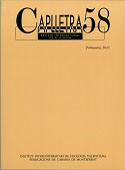Is it the sighing of “The last flower of Latium”?
DOI:
https://doi.org/10.7203/caplletra.58.7136Keywords:
Comparative History of Literature, Castilian, Catalan, Count D. Pedro de Barcelos, Antônio Vieira, Olavo Bilac Abstract
Abstract
Abstract: The work analyses the formation of the Portuguese language and its literary and historical parallels with Castilian and Catalan. With this aim, we first contextualize the linguistic and literary trajectory of Iberian-Romance languages, in order to highlight similarities and diff erences in Hispania. As case studies, we consider three authors who elevated and enhanced the Portuguese language of their own time: Pedro de Barcelos (1287-1354), with Crónica Geral de Espanha de 1344, the Jesuit and priest Antonio Vieira (1608-1697), with Sermão vigésimo do Rosário, and the Parnassian poet Olavo Bilac (1865-1918), with the poem Profissão de Fé.
Key words: Comparative History of Literature, Castilian, Catalan, Count D. Pedro de Barcelos, Antônio Vieira, Olavo Bilac.
 Downloads
Downloads
Downloads
Published
How to Cite
-
Abstract524
-
PDF (Català)308
Issue
Section
License
Authors submitting work to Caplletra for publication must be the legitimate holder of the usage rights. Legitimacy for the purposes of publishing the work must also include images, tables, diagrams and any other materials that may complement the text, whether they are the author of such material or not.
Copyright: on publishing their work in the journal, the author grants Caplletra. Revista Internacional de Filologia usage rights (reproduction, distribution and public communication) for both the paper printed version and for the electronic version.
All work published in Caplletra is covered by the Creative Commons license type Attribution-NonCommercial-NoDerivatives 4.0 (CC BY-NC-ND 4.0).
RESPONSABILITY
Caplletra. Revista Internacional de Filologia does not necessarily identify with the points of view expressed in the papers it publishes.
Caplletra. Revista Internacional de Filologia accepts no responsibility whatsoever for any eventual infringement of intellectual property rights on the part of authors.






